Solved GATE Questions on Dynamics
Question 1. Mass M slides in a frictionless slot in the horizontal direction and the bob of the mass m is hinged to mass M at C, through a rigid massless rod. The system is released from rest with  , the velocities of
, the velocities of  and
and  can be determined using the fact that, for the system (i.e., m and M together),
can be determined using the fact that, for the system (i.e., m and M together),
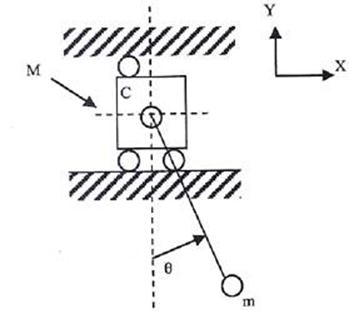
(A) the linear momentum in X and Y directions are conserved but the energy is not conserved.
(B) the linear momentum in X and Y directions are conserved and the energy is also conserved
(C) the linear momentum in X direction is conserved and the energy is also conserved
(D) the linear momentum in Y direction is conserved and the energy is also conserved
GATE-ME-2001
Hint 1. (Ans C)
Question 2. A participle P is projected from the earth surface at latitude 45 with escape velocity
with escape velocity  . The velocity direction makes an angle
. The velocity direction makes an angle  with the local vertical. The particle will escape the earth’s gravitational field.
with the local vertical. The particle will escape the earth’s gravitational field.
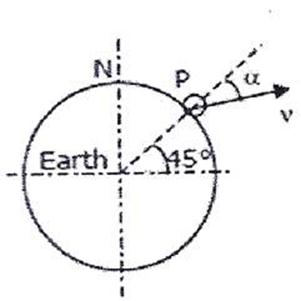
(A) Only when 
(B) Only when 
(C) Only when 
(D) Irrespective of the value of
GATE-ME-2001
Hint 2. (Ans D)
Question 3. In the figure shown, the spring deflects by  to position A (the equilibrium position) when a mass m is kept on it, During free vibration, the mass is at position B at some instant. The change in potential energy of the spring-mass system from position A to position B is
to position A (the equilibrium position) when a mass m is kept on it, During free vibration, the mass is at position B at some instant. The change in potential energy of the spring-mass system from position A to position B is
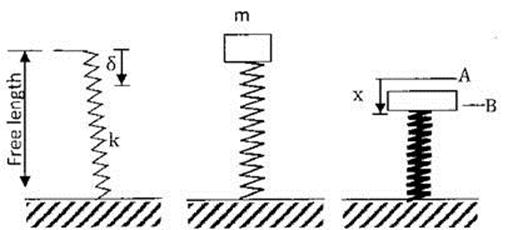
(A) ½ kx2
(B) ½ kx2-mgx
(C) ½ k(x+ )2
)2
(D) ½ kx2+mgx
GATE-ME-2001
Hint 3. (Ans B)
Potential energy at 
Total energy at 
:. Change in energy


Data for Q.4-5 are given below. Solve the problems and choose correct answers
A reel of mass “m” and radius of gyration “K” is rolling down smoothly from rest with one end of the thread wound on it held in the ceiling as depicted in the figure. Consider the thickness of the thread and its mass negligible in comparison with the radius “r” of the hub and the reel mass “m”. Symbol “g” represents the acceleration due to gravity.
GATE-ME-2001
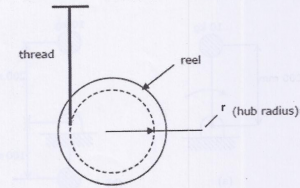
Question 4. The linear acceleration of the reel is
(A) gr2/(r2+k2)
(B) gk2/(r2+k2)
(C) grk/(r2+k2)
(D) mgr2/(r2+k2)
Hint 4. [Ans.A]
Given m = mass of the reel
k= radius of gyration
r= radius of the hub
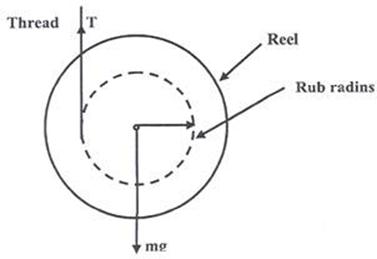
For vertical translational motion

Where T=tension in thread
 =tangential acceleration of the point of contact of thread and hub.
=tangential acceleration of the point of contact of thread and hub.
For rotation motion



From equations (ii) and (i), we get



Question 5. The tension in the thread is
(A) mgr2/(r2+k2)
(B) mgrk2/(r2+k2)
(C) mgk2/(r2+k2)
(D) mg/(r2+k2)
Hint 5. (Ans C)


Question 6. A bullet of mass “m” travels at a very high velocity v (as shown in the figure) and gets embedded inside the block of mass “M” initially at rest on a rough horizontal floor. The block with the bullet is seen to move a distance “S” along the floor. Assuming  to be the coefficient of kinetic friction between the block and the floor and “g” the acceleration due to gravity. What is the velocity v of the bullet?
to be the coefficient of kinetic friction between the block and the floor and “g” the acceleration due to gravity. What is the velocity v of the bullet?
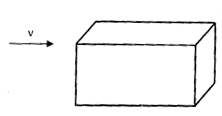
(A) ![]()
(B)![]()
(C)![]()
(D) ![]()
GATE-ME-2001
Hint 6. (Ans A)




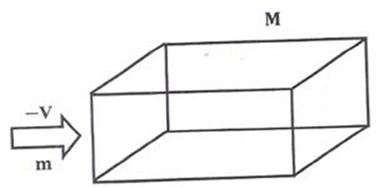
Form conservation of linear momentum


For horizontal equilibrium of body



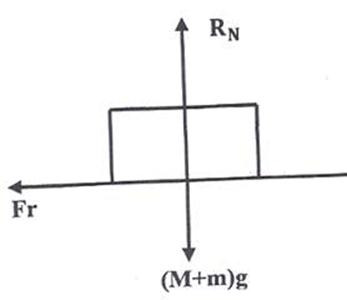
(-ve sign shows that the acceleration is opposite to motion)




From equation (i)



Question 7. A rigid body shown in the Fig, (a) has a mass of 10 kg. It rotates with a uniform angular velocity ‘w’. A balancing mass of 20 kg is attached as shown in Fig.(b). The percentage increase in mass moment of inertia as a result of this addition is
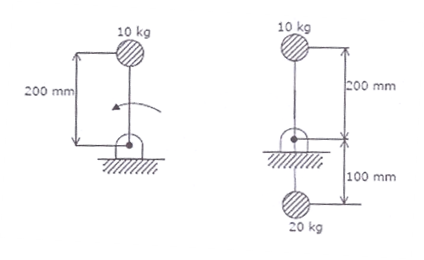
(a) (b)
(A) 25 %
(B) 50 %
(C) 100%
(D) 200 %
GATE-ME-2004
Hint 7. (Ans. B)
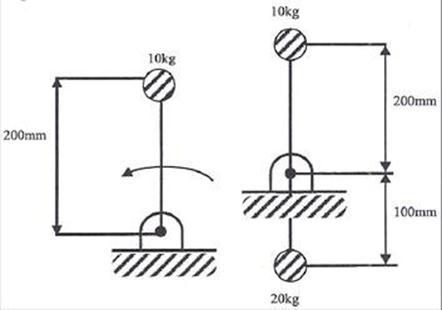




Question 8. An ejector mechanism consists of a helical compression spring having a spring constant of K=981x 103 N/m. It is pre-compressed by 100 mm from its free state. If it is used to eject a mass of 100 kg held on it, the mass will move up through a distance of
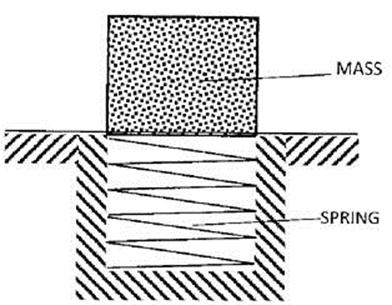
(A) 100mm
(B) 500mm
(C) 981mm
(D) 1000 mm
GATE-ME-2004
Hint 8. (Ans. A)
From the conservation of energy after pre compression,
Initial energy=Final energy
Or 
Or 
Or 
Or 

Taking +ve sign , x=100 mm
Question 9. A uniform stiff rod-of length 300 mm and having a weight of 300 N is pivoted at one end and connected to a spring at the other end. For keeping the rod vertical in a stable position the minimum value of spring constant K needed is
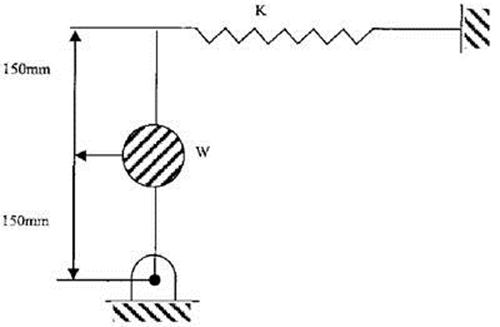
(A) 300 N/m
(B) 400 N/m
(C) 500 N/m
(D) 1000 N/m
GATE-ME-2004
Hint 9. (Ans.C)
Let the weight be displaced by x from equilibrium position. Then


Taking moment about hinged point
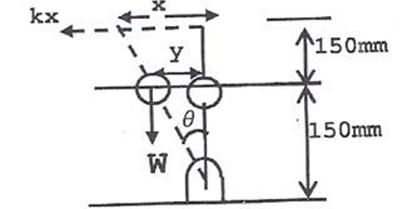


1. (C), 2. (D), 3. (B), 4. (A), 5. (C), 6. (A), 7. (B), 8. (A), 9. (C),